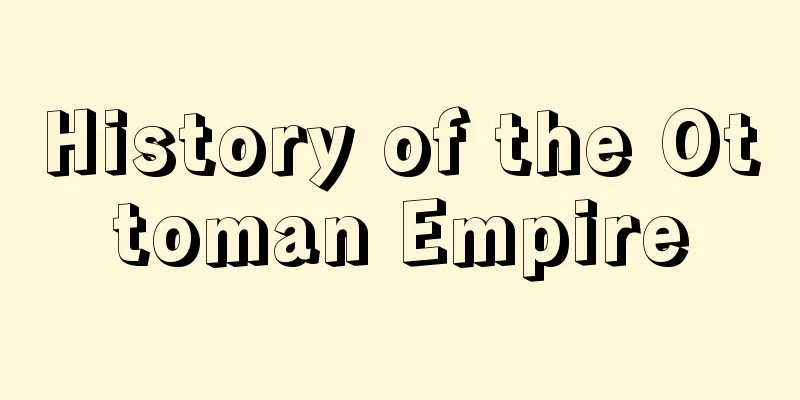Enrich the country and strengthen the military

|
An argument or policy that seeks to promote domestic economic development and strengthen military power. Generally, it is a policy that emerged in developing countries when nation states were being established, but it was used specifically in Japan from the end of the Edo period and the Meiji Restoration to the Meiji era as a term indicating the national goal. From the end of the 18th century onwards, the sense of crisis over the advance of Western powers gave rise to arguments such as naval defense and enriching the country and strengthening the military, but these were linked to the Sonno Joi (revere the Emperor and expel the barbarians) argument and strengthened the desire for a unified nation. In the reforms of the shogunate and feudal domains at the end of the Edo period, the slogan of enriching the country and strengthening the military was used by the shogunate and domains to intervene in the distribution of goods and carry out military reforms, but it was only after the Meiji Restoration that this was systematized as a national policy. The goal of the Meiji state was to catch up with Western countries in terms of national power, law, and culture, and enriching the country and strengthening the military were the main pillars of this goal. The content of enriching the country was a policy of promoting industry by adopting capitalist systems and modern technology to protect and develop various industries, while the content of strengthening the military was to build and strengthen the army and navy by adopting conscription and a modern military system. Both aspects required the active participation and initiative of the people, and enriching the country and strengthening the military naturally involved enlightenment activities that promoted civilization and enlightenment and self-awareness among the people. With a limited range of policies and a narrow foundation for the national economy, the question was whether to prioritize enriching the country or strengthening the military, and the center of gravity shifted depending on the position and time, and at times there were even signs of conflict. For about 10 years after the defeat of the debate on the Korean Expedition in 1873 (Meiji 6), there was concern about the decline of national power due to trade imbalances, so policies to promote industry centered on import-export related industries were attempted, and the emphasis was on enriching the country. However, in the 1980s, as the conflict with Qing China over Korea deepened and the imperialist activities of the great powers in East Asia became more prominent, there was a strong tendency to strengthen the military even at the expense of the people's lives, which are the foundation of a wealthy country. For this reason, in the initial parliament that began in 1890, the Democratic Party's demand for resting the people's power clashed with the government's policy of strengthening the military. After the Sino-Japanese War, Japan's capitalist economy was established and the country's wealth expanded, but at the same time, the pace of expansion of the army and navy, with advanced nations as hypothetical enemies, far exceeded this, and the balance between a wealthy nation and a strong military was almost lost. In the 20th century, Japan developed in a direction that compensated for the weakness of the foundation of its national economy with military and political superiority over the continent, and in that sense, the concepts of a wealthy nation and a strong military lost their meaning as opposing concepts. [Hideo Nagai] "Inoue Kiyoshi, 'New Edition of Japanese Militarism', III (1975, Gendai Hyoronsha)" "Ishizuka Hiromichi, 'Research on the History of the Establishment of Japanese Capitalism' (1973, Yoshikawa Kobunkan) " "Nagai Hideo, 'Issues Surrounding the National Policy of the Meiji State'" (Hokkaido University Faculty of Letters Bulletin 16-1, 1968) [Reference item] |Source: Shogakukan Encyclopedia Nipponica About Encyclopedia Nipponica Information | Legend |
|
国内の経済発展を図り軍事力を強化しようとする主張または政策。一般的には民族国家成立期の後進諸国に現れる政策であるが、特殊的には幕末・維新期から明治期にかけての日本で、国家目標を示すことばとして用いられた。18世紀末以降、欧米列強の進出に対する危機意識は海防論、富国強兵論などの主張を生み出したが、これらは尊王攘夷(そんのうじょうい)論と結び付いて統一国家への志向を強めた。幕末の幕政・藩政の改革においても富国強兵をスローガンとして幕府、藩による商品流通への介入や軍事改革が行われたが、それが国家による政策として体系化されたのは維新以後である。国力のうえでも、法制・文化のうえでも欧米諸国に追い付くことが明治国家の目標とされたが、富国と強兵はその主要な柱であった。富国の内容は資本主義的な制度と近代技術を取り入れて諸産業を保護育成する殖産興業政策であり、強兵の内容は徴兵令と近代的軍事制度の採用によって陸海軍を建設強化することであった。いずれの面からも国民の主体的な活動や参加が必要であり、富国強兵には、おのずから文明開化や人民の自覚を促す啓蒙(けいもう)活動が伴った。 限られた政策の幅や、狭い国民経済の基盤のうえでは、富国と強兵のどちらを優先するかが問題であり、時期により立場によって重心が変動し、ときには対立の様相もみられた。1873年(明治6)に征韓論が敗れてから、約10年の間は、貿易不均衡による国力の減退が憂慮された時期だったので、輸出入関連産業を中心とする殖産興業政策が試みられ、富国に力点があったといえる。しかし、80年代に、朝鮮をめぐって清(しん)国との対立が深まり、一方、列強の東アジアでの帝国主義的活動が顕著になってくると、富国の基礎である国民生活を多少犠牲にしても軍事力を強化しようとする傾向が強くなった。このため、90年に始まる初期議会では、民党の掲げる民力休養の要求と政府の強兵策が衝突することになった。日清戦争以後、日本の資本主義経済が成立し、国富も拡大したが、一方、先進国を仮想敵とする陸海軍の増強のテンポは、はるかにこれを上回り、富国と強兵のバランスはほとんど失われた。20世紀に入ると、日本は国民経済の基盤の弱さを、大陸に対する軍事的・政治的優位でカバーするという方向に発展し、その意味では、富国と強兵とは対立する概念としての意義を失った。 [永井秀夫] 『井上清著『新版日本の軍国主義』Ⅲ(1975・現代評論社)』▽『石塚裕道著『日本資本主義成立史研究』(1973・吉川弘文館)』▽『永井秀夫「明治国家の国是をめぐる問題」(『北海道大学文学部紀要』16の1所収・1968)』 [参照項目] |出典 小学館 日本大百科全書(ニッポニカ)日本大百科全書(ニッポニカ)について 情報 | 凡例 |
<<: Principle of non-fairness - nemo iudex sine actore (Latin)
>>: Bukō Chronology - Bukō Chronology
Recommend
Glacial flora
During the Quaternary Pleistocene, at least four c...
Bill buying and selling market
This is a market where commercial bills and bank ...
Rungis (English spelling)
A town in the Val-de-Marne department in northern ...
Cheap Accommodation King - Asukabeou
Years of birth: unknown. A member of the imperial ...
Thermal decomposition
The decomposition of molecules by heating. Used a...
Barrel shop - Okeya
A craftsman who produces barrels. In the past, th...
Rank and Order - Ikaikunto
In ancient times, it was a kind of status mark, an...
Agelastes meleagrides (English spelling) Agelastesmeleagrides
...The legs are strong and well developed. The fo...
Xiang Yu
He was one of the heroes who appeared during the ...
Tamausagi - Tamausagi
[1] 〘Noun〙① A rabbit believed to live on the moon....
Tati (English spelling) Jacques Tati
French film director and actor. Born in Pecq, Sei...
The palace of the nightingale
...A story about a man who peeks into rooms that ...
Esch
...The conclusions that are now generally accepte...
Campo - Kanpo (English spelling) Campo
It refers to the savanna (Campo Cerrado) and gras...
Annular jet type air cushion ship - Annular jet type air cushion ship
...A vehicle that floats near the water surface b...









